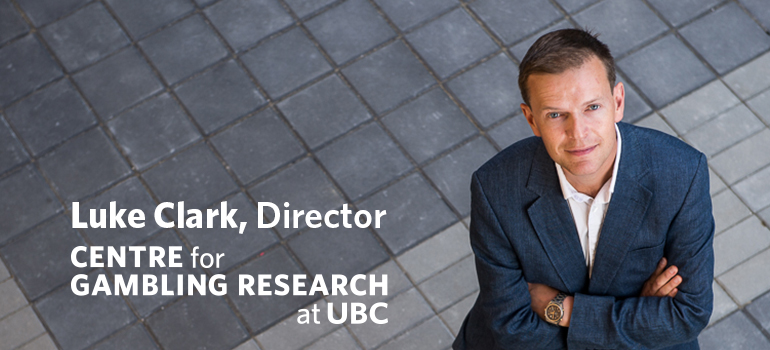

Clark, who led the UK’s largest study of pathological gamblers, will lead the academic and operational activities of the Centre beginning July 1, 2014. He will work closely with researchers and partners to identify and promote collaborative research opportunities.
“Leading the Centre for Gambling Research at UBC is an exciting opportunity to study the psychological and neurobiological factors in individuals with gambling problems,” says Clark. “The Centre aims to reduce the harms caused by problem gambling and to improve evidence-based gambling policy. The Centre will offer new opportunities for collaboration with other addictions researchers, with counselors and clinicians, and with the gambling industry and policy makers.”
Clark is currently a faculty member in the Dept. of Psychology at the University of Cambridge. His research explores the influence of gambling on decision-making and the neural and cognitive changes affecting problem gamblers. He works closely with the UK National Problem Gambling Clinic and has published groundbreaking research on brain responses to gambling.
“We are extremely fortunate to have Luke Clark direct the Centre,” says Prof. Alan Kingstone, head of UBC’s Dept. of Psychology. “This will be one of a handful of centres worldwide dedicated to research on gambling psychology and problem gambling and we will be able to leverage Luke’s foundational work in this field.”
Established with $2 million in funding from the B.C. Government and the British Columbia Lottery Corporation (BCLC), the Centre will operate with complete academic independence from BCLC, the government and the gambling industry.
“This Centre, thanks to support from BCLC and the Province, will help to increase our shared knowledge of gambling addiction and to provide evidence-based support for improved gaming policy and programs,” says Gage Averill, Dean of UBC’s Faculty of Arts, who announced Clark’s hiring today at the 2014 New Horizons in Responsible Gambling Conference.
Background
The main goals of the Centre for Gambling Research at UBC are to reduce the harm caused by problem gambling and improve evidence-based gambling policy through studying the psychology and the neuroscience of gambling games and problem gamblers. The Centre will support graduate and post-graduate research and training and offer undergraduate courses. The Centre will investigate:
- Human multisensory attention and behaviour
- Judgment and decision making
- Cross-cultural influences on human behaviour
- The neural systems involved in risk-based decisions
- The influences of reward on behaviour
The Centre adds to UBC’s internationally recognized expertise in addiction research – including pioneering projects on drug and alcohol addictions– which aims to reduce the harmful impacts of addiction and build healthier, more resilient communities.
The funding received to establish the Centre is part of UBC’s start an evolution campaign, Canada’s most ambitious fundraising and alumni engagement campaign, which has raised more than $1 billion to date.


